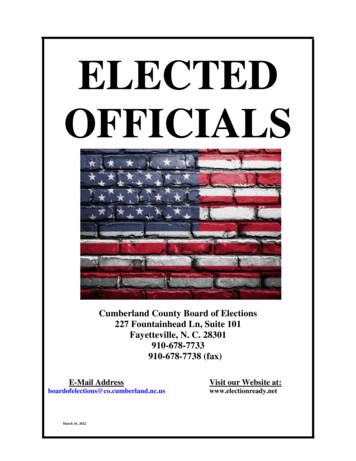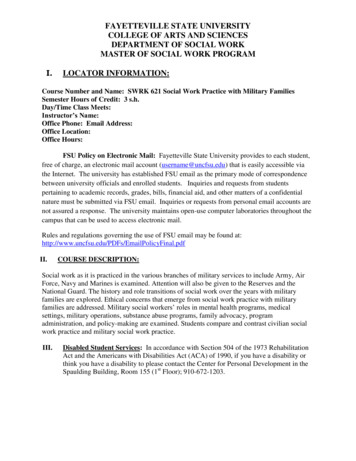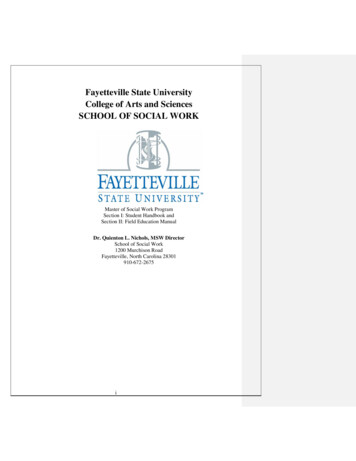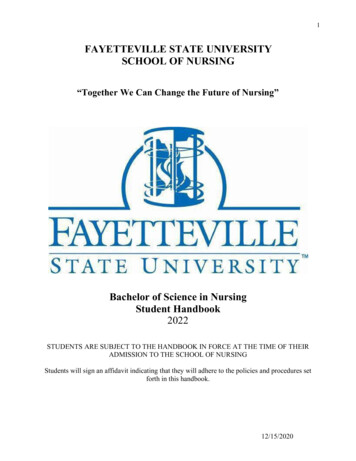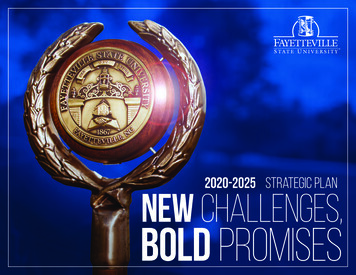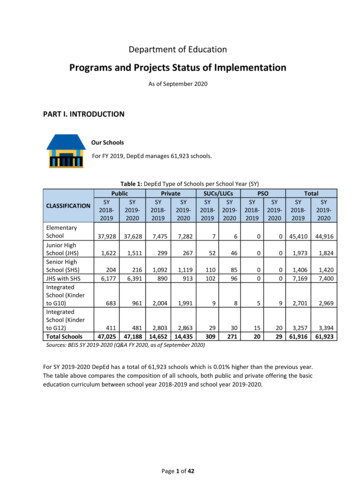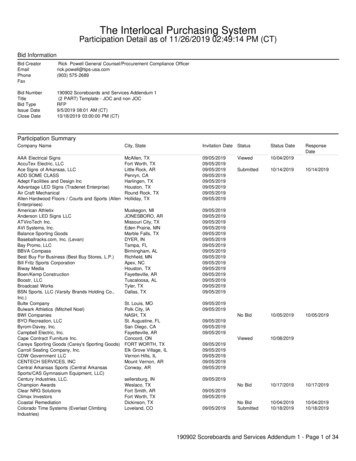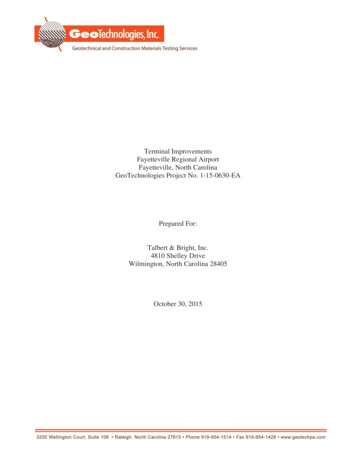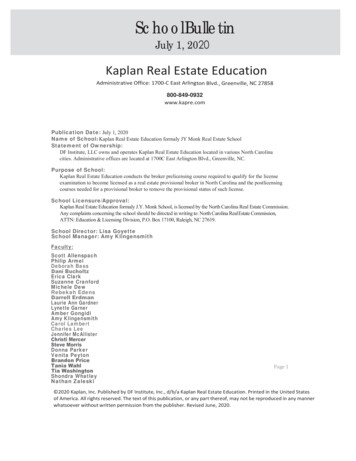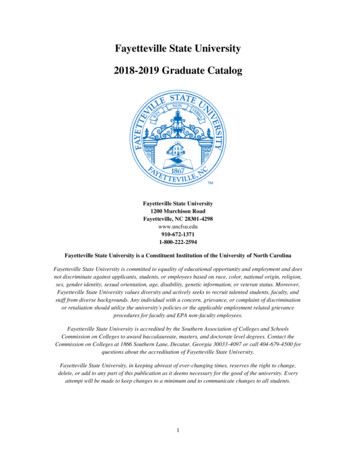
Transcription
Fayetteville State University2018-2019 Graduate CatalogFayetteville State University1200 Murchison RoadFayetteville, NC Fayetteville State University is a Constituent Institution of the University of North CarolinaFayetteville State University is committed to equality of educational opportunity and employment and doesnot discriminate against applicants, students, or employees based on race, color, national origin, religion,sex, gender identity, sexual orientation, age, disability, genetic information, or veteran status. Moreover,Fayetteville State University values diversity and actively seeks to recruit talented students, faculty, andstaff from diverse backgrounds. Any individual with a concern, grievance, or complaint of discriminationor retaliation should utilize the university's policies or the applicable employment related grievanceprocedures for faculty and EPA non-faculty employees.Fayetteville State University is accredited by the Southern Association of Colleges and SchoolsCommission on Colleges to award baccalaureate, masters, and doctorate level degrees. Contact theCommission on Colleges at 1866 Southern Lane, Decatur, Georgia 30033-4097 or call 404-679-4500 forquestions about the accreditation of Fayetteville State University.Fayetteville State University, in keeping abreast of ever-changing times, reserves the right to change,delete, or add to any part of this publication as it deems necessary for the good of the university. Everyattempt will be made to keep changes to a minimum and to communicate changes to all students.1
Table of ContentsChancellor’s Message3General Information5Admissions19Expenses28Financial Aid32Student Affairs41Academic Regulations51College of Arts and Sciences77Department of Biological Sciences77Department of Criminal Justice77Department of English82Department of Mathematics and Computer Science85Department of Performing and Fine Arts86Department of Psychology86School of Social Work88Department of Sociology98Broadwell College of Business and Economics103College of Education116Department of Educational Leadership117Department of Elementary Education122Department of Middle Grades, Secondary, and Specialized Subjects130Course Descriptions1712
Chancellor's MessageI am honored and excited to serve as the CEO of Fayetteville State University. This university was foundedupon a great historical legacy that will contribute to our emergence as a competitive and modern 21stcentury institution. We will honor the dynamic history of this university in 2017 when the universitycelebrates its Sesquicentennial Birthday 1867-2017 (150th Anniversary). It will be one of the mostmemorable events in this institution's already storied legacy.My task is to apply leadership and management strategies that reflect integrity, quality, transparency, andexcellence. Our most precious commodity is our students and everything that we do should support theirgrowth, maturity, and success. Our five-year strategic plan will be the map that guides us as we seek toprovide the best experiences possible for our students. "From a Proud Legacy to a Twenty-First CenturyWorld-Class University of Choice" will be the guiding theme for the next five years. The three strategicpriorities for 2015-2020 are: 1) Retention and Graduation Rates, 2) Collaborations and Partnerships, and 3)Efficiency, Effectiveness, and Sustainability.I appreciate the daily efforts of our faculty, staff and administrators, and the support from our alumni, thecommunity, and friends worldwide. I truly become emotional when I say that I am "Proud to Be" theChancellor of Fayetteville State University.Notable Achievements under Chancellor Anderson'sLeadership The Economic Impact of FSU on Fayetteville and Cumberland County (2012-13) included 153.8million in total economic output; 2,210 jobs; 104.4 million in labor income; 5.4 million in taxes;and 195 million in incremental salary value of FSU alumni currently residing in CumberlandCounty. Over 75 million in research, campus operations, and new construction includedemployment of local contractors and subcontractors.From 2010-2013, clean state audits and only minimal recommendations since then.In terms of educating FSU graduates (2012-2013), North Carolina tax payers received 16.13 foreach dollar of state funds expended (11.5% ROI) ; and in terms of Federal appropriations, 54.55was generated for each dollar of federal funds expended (15.1% ROI)When Chancellor Anderson arrived at FSU, grant funding was 5.5 million. For 2014-15 it willapproach 12 million.Alumni giving (donations) was 3.1% in 2008 and is currently 12.6%. FSU has doubled the numberof alums who give and we have initiated our first comprehensive capital campaign.From 2008-2013, FSU had 1,293 graduates in graduate or professional school (29% of all awardeddegrees).Since 2013, the FSU Pre-Law Society has advised 42 students and 39 have been accepted intoLaw School (93% acceptance rate).FSU received continued NCATE Accreditation for teacher education and SACS Reaffirmation ofthe entire university.FSU ranks as the top HBCU producer of teachers in North Carolina and 8th in the nation.Affordable Colleges Foundation (AFC) states that FSU has the nation's 20th ranked onlinepsychology program, and the 16th ranked criminal justice program.3
The Social Science Research Network (SSRN) ranks FSU's College of Business and Economics63d best in the country (#116 in the world). FSU is the 3d ranked Business program in NC behindDuke and UNC Chapel Hill and the highest ranked HBCU in the country. The MBA program isranked #4 in NC and among the top 50 in the nation.According to forensicscolleges.com, FSU has the #2 ranked Forensic Biology program in thecountry and one of only two in North Carolina selected for their listing.The Nursing Program has a 100% pass rate on the NCLEX and ranked #2 in the Eastern andSoutheastern region of the U.S. and best among NC Nursing programs (NurseJournal.org 2015).Other top ranked accredited programs include, Social Work, Criminal Justice, Computer Science,and Visual Arts.The National Geospatial-Intelligence Agency recently designated FSU as a Center of Excellence(the only UNC school and HBCU to have the GEOINT Certificate accreditation).College Factual ranks FSU as the nation's 33rd best college for veterans. FSU is the only NCinstitution ranked in the top 50. Military Times publication ranked FSU as the top school in NC onits "2014 Best for Vets Colleges" listing. FSU offers the only Master's degree in Social Work on amilitary base in the country (Fort Sam Houston, San Antonio, TX).FSU's Center for Defense and Homeland Security offers certificates in Cyber Security(Foundations and Advanced).FSU now has a strong global footprint in China, Africa, and an emerging one in India.FSU has been cited as North Carolina's most affordable online university.4
General InformationMission StatementFayetteville State University (FSU) is a public comprehensive regional university that promotes theeducational, social, cultural, and economic transformation of southeastern North Carolina and beyond. Theprimary mission of FSU is to provide students with the highest quality learning experiences that willproduce global citizens and leaders as change agents for shaping the future of the State. Awarding degreesat the baccalaureate and master's levels, and the doctorate in educational leadership, FSU offers programsin teacher education, the arts and sciences, health professions, business and economics, and unique andemerging fields. FSU is an institution of opportunity and diversity. Committed to excellence in teaching,research, scholarship, and service, the university extends its services and programs to the community,including the military, and other educational institutions throughout North Carolina, the nation, and theworld.FSU Vision StatementFayetteville State University is a leading institution of opportunity and diversity committed to developinglearned and responsible global citizens.FSU Core Identity StatementFayetteville State University is a historically black university founded in 1867 as the Howard School byseven black men for the purpose of educating black children. FSU has a tradition of excellence in teachereducation and is the second oldest state supported school in North Carolina. The student body, faculty, andstaff today rank among the nation's most diverse campus communities. With program expansion, theuniversity has strong undergraduate and graduate programs in teacher education, the arts and sciences,health professions, business and economics, and is developing programs in unique and emerging fields.FSU has a tradition of collaboration with the Fayetteville/Fort Bragg-Pope Air Force Base community, andrenders services throughout southeastern North Carolina. FSU has a tradition of an affordable educationand of preparing students to be life-long learners, to be responsible citizens, and to render selfless service tomankind.FSU Core ValuesStudent Success and the Pursuit of ExcellenceWe believe in student success and the obligation of the university to provide the highest quality learningexperiences and academic programs to facilitate student success, intellectual and cultural growth,excellence in scholarship, leadership, and ethical standards.5
Shared GovernanceWe believe in shared governance, fiscal responsibility, a commitment to life-long learning, andprofessional development for faculty, staff, and students.Global ResponsibilityWe believe in respect for diversity, global responsibility, conservation of natural resources, and acommitment to sustainability.CollaborationWe believe in outreach, partnerships with educational institutions, engagement with the military and thecommunity, economic transformation of the state, and service to others.AdministrationBoard of TrusteesTrusteeTerm Expires TrusteeDr. Richard Clayton AdamsFayetteville2021**Mrs. Sherida McMullanRaleigh2021***Dr. Harvey H. Allen, Jr.Lumberton2019**Dr. John G. McNeilFayetteville2021***Mr. Stuart AugustineFayetteville2021**Mrs. Vedas Neal (Vice Chair)Elm City2019**Dr. Edward E. DickersonFayetteville2019**Dr. Brandon PhillipsFayetteville2021**Mr. Jodie Ervin (Chair)Raleigh2019***Mr. Donald L. PorterFayetteville2019**Mr. Karee Brown-JonesFayetteville(Ex Officio,2018-2019)Ms. Brenda Timberlake (Secretary)2021**CreedmoorMr. Kirk deViereFayetteville**UNC Board of Governors' Appointee*** Governor's Appointee6Term Expires2019**
Administrative OfficersNameDegreesTitleJames A. AndersonB.A., Ph.D.ChancellorJon YoungB.A., M.A., Ph.D.Chief of StaffPamela JacksonB.A., M.P.A., M.B.A., Ph.D.Interim Provost and ViceChancellor for Academic AffairsJanice HaynieB.A., M.S., Ph.D.Vice Chancellor for Student AffairsCarlton SpellmanB.B.A., M.B.A.Vice Chancellor for Business andFinanceArasu GanesanB.A., M.B.A.Vice Chancellor for InformationTechnologyWanda D. Lessane JenkinsB.B.A., M.B.A., J.D.University Legal CounselSamuel Adu-MirekuB.S., M.S., Ph.DDean, College of Arts and SciencesJ. Lee BrownB.S., M.B.A., Ph.D.Interim Dean, College of Businessand EconomicsJohn BrooksB.A., M.A., Ph.D.Dean, University CollegeMarion Gillis-OlionB.A., M.A., Ph.DDean, College of EducationHistoryIn 1867, seven black men - Matthew N. Leary, Jr., A. J. Chesnutt, Robert Simmons, George Grainger, Jr.,Thomas Lomax, Nelson Carter, and David A. Bryant - paid 136 for two lots on Gillespie Street andconverted themselves into a self-perpetuating Board of Trustees to maintain this property permanently as asite for the education of black children in Fayetteville. General Oliver O. Howard of the Freedman'sBureau, erected a building on this site, and the institution became known as the Howard School. RobertHarris was selected as the principal.By a legislative act of 1877, the North Carolina General Assembly provided for the establishment of aNormal School for the education of black teachers. The Howard School was chosen as the most promisingbecause of its successful record during the previous ten years under the leadership of Robert Harris. Itsname was changed to the State Colored Normal School and Harris remained as principal until his death in1880.7
Charles W. Chesnutt was principal from 1880 to 1883. He emphasized foreign languages, social graces,and intellectual development as keys to success. He resigned to pursue a literary career and indeed becameone of the leading black American writers of fiction between 1887 and 1930.Ezekiel E. Smith became the third principal in 1883 and would serve three different terms in this leadershipposition. His first term as principal lasted from 1883-1888. He expanded the curriculum to better prepareteachers for the public grammar schools. In 1888 George Williams became the principal and introduced aSpeaker's Series. Smith returned in 1895 after serving as an ambassador in Liberia. In 1898, he left to servein the Spanish American War. Reverend Leonard E. Fairley served as acting principal until Smith returnedin 1899.Between 1899 and 1933, Dr. E.E. Smith's vision for excellence in teaching would lay the framework for theNormal School to become a college. By the time he retired in 1933, the school had grown from three roomsin a small frame structure to a physical plant of ten buildings on a fifty-acre tract of land. Black and whitecitizens contributed funds along with Dr. Smith, F. D. Williston, E. N. Williams, J. G. Smith and Dr. P. N.Melchor, to purchase the initial forty acres of land. With the erection of the Aycock Building by the state in1908, the school began its permanent residency on Murchison Road. Smith's title was changed fromprincipal to president in 1927. The Newbold School, a practice school for teachers, was erected on thecampus in 1930. Dr. E.E. Smith's ideas about teacher training set the pace for teacher education throughoutthe state. His years of service covered a span of fifty years-1883 to 1933.Dr. James Ward Seabrook became the president in 1933. Under his presidency the school becameFayetteville State Teachers College, thereafter being authorized to grant the Bachelor of Science Degree inElementary Education. Cultural activities, student organizations, and significant physical expansioncontributed to the complete transformation from a normal school to a college. The college received bothstate and regional accreditation in 1947.Dr. Rudolph Jones succeeded Dr. Seabrook in 1956. During his administration, the curriculum wasexpanded to include majors in secondary education and programs leading to degrees outside the teachingfield. The name of the school was changed to Fayetteville State College in 1963. FSC students were activeparticipants in the Civil Rights Movement of the sixties and helped to bring about integration inFayetteville. Also, under the leadership of Dr. Jones, six additions were made to the physical plant toaccommodate a rapidly expanding enrollment.Dr. Charles A. Lyons, Jr. was appointed president in 1969 and the institution acquired its present name. Bya legislative act in 1972, Fayetteville State University became a constituent institution of the University ofNorth Carolina System, and Dr. Lyons became its first Chancellor. During his tenure, the curriculum wasexpanded to include a variety of both baccalaureate and master's level programs. The Fort Bragg-Pope AFBExtension Center, in conjunction with the Weekend and Evening College, was established in order toprovide military personnel and other full-time working people with the opportunity to further theireducation. The general academic structure took its present configuration in 1985 when the universitybecame a Comprehensive Level I Institution. In addition to expanding program offerings and services,eight buildings were added to the physical plant during this period.On January 1, 1988, Dr. Lloyd V. Hackley became the eighth Chief Executive Officer of the university. Inhis seven years as Chancellor, the university expanded its master's level program offerings to includebiology, business administration, education, English, history, mathematics, psychology, and sociology, andFSU's first doctoral program in Educational Leadership was established. Baccalaureate program offeringswere also increased to include 36 disciplines in the arts and sciences, business and economics, andeducation. Hackley strengthened FSU's community outreach to at-risk children in the public schools and8
established numerous scholarship and tutoring/mentoring programs to encourage more young people toaspire to academic excellence and a college education. FSU's first major public Capital Campaign was alsocompleted, which enabled the university to increase the number of privately funded scholarships. Thestudent population doubled in numbers and in diversity during his administration. The addition of the ultramodern School of Business and Economics Building and the Health and Physical Education Buildingunderscored Dr. Hackley's commitment to FSU's continued expansion and growth. On December 31, 1994,Dr. Hackley left his post to become President of the North Carolina Department of Community Colleges,the first African-American to lead the state's system of 59 community colleges.Dr. Donna J. Benson, Associate Vice President for Academic Affairs of the University of North Carolinaserved as Interim Chancellor from January 1, 1995 to November 15, 1995.Capital improvements includedrenovation of dormitories and completion of the Distance Learning Center in the CommunicationsBuilding.In 1995 Dr. Willis B. McLeod, a 1964 graduate of Fayetteville State University, became the ninth ChiefExecutive Officer of FSU and the first alumnus to serve as Chancellor. Among the initiatives he institutedwere the "Freshman Year Initiative" (or F.Y.I.), a program designed to enhance students' educationaloutcomes; new outreach efforts aimed at forging stronger community ties; and formed a regionalpartnership of public school, community college, and university leaders which focused on strengthening theeducational pipeline from pre-school to post-graduate studies. Renovation and improvement of campusfacilities were achieved, including all air-conditioned buildings. A strong cultural and fine arts series andfourteen CIAA championships bolstered Bronco Pride.Dr. T. J. Bryan assumed the position of Chancellor on July 1, 2003. As the tenth chief executive officer ofthe university, Dr. Bryan was the first African-American woman selected to lead a constituent institution ofthe University of North Carolina. Dr. Bryan developed new academic programs, obtained specializedaccreditation for several programs, strengthened student recruitment and support programs, and improvedbuildings and grounds. Under her leadership, a four-year nursing program and an Honors Program wereestablished.In 2007 Dr. Lloyd V. Hackley returned as Interim Chancellor. He launched projects to carry out theinitiatives of UNC Tomorrow, placed FSU on a sound course for fiscal solvency, and introduced a numberof organizational changes for greater efficiency of operations.Dr. James A. Anderson was named the eleventh Chief Executive Officer of Fayetteville State University onMarch 7, 2008. Under Chancellor Anderson's leadership, the university has established a five year strategicplan for growth, expanded academic program offerings, added global education and study abroad, andincreased certification and accreditation of academic programs. The university has expanded partnershipswith universities, corporations, and the military. Outreach also includes service learning, a communitycomputer center, a Veteran Center, the Early High School College, the Center for Defense and HomelandSecurity, and many collaborative cultural activities with community agencies.Dr. Anderson is committed to making FSU a university of choice by enabling students to be successfulthrough advanced technology, new cutting edge academic programs, expanded partnerships with thecommunity and educational institutions, globalism, an improved campus environment, and professionaldevelopment opportunities for faculty, staff, and students.9
Administration of the University of North CarolinaThe Board of GovernorsW. Louis Bissette, Jr., ChairmanHarry L. Smith, Jr., Vice ChairmanPearl Burris-Floyd, Secretary2015-19 Term2017-2021 TermDarrell AllisonKellie Hunt BlueC. Philip ByersRobert P. Bryan IIIWalter C. DavenportCarolyn L. CowardThom GoolsbyN. Leo DaughtryH. Frank GraingerThomas H. FetzerJames L. Holmes, Jr.W. Marty Kotis IIIJoe KnottSteven B. LongAnn MaxwellWendy F. MurphyJ. Alex MitchellR. Boyle ParrishAnna S. NelsonRandall "Randy" RamseyDavid M. PowersRobert A. RuchoO. Temple Sloan IIIWilliam WebbMichael WillifordHistory of the University of North CarolinaIn North Carolina, all the public educational institutions that grant baccalaureate degrees are part of theUniversity of North Carolina. Fayetteville State University is one of the 16 constituent institutions of themulti-campus state university.The University of North Carolina, chartered by the N.C. General Assembly in 1789, was the first publicuniversity in the United States to open its doors and the only one to graduate students in the eighteenthcentury. The first class was admitted in Chapel Hill in 1795. For the next 136 years, the only campus of theUniversity of North Carolina was at Chapel Hill.10
In 1877, the N.C. General Assembly began sponsoring additional institutions of higher education, diversein origin and purpose. Five were historically black institutions, and another was founded to educateAmerican Indians. Several were created to prepare teachers for the public schools. Others had atechnological emphasis. One is a training school for performing artists.In 1931, the N.C. General Assembly redefined the University of North Carolina to include three statesupported institutions: the campus at Chapel Hill (now the University of North Carolina at Chapel Hill),North Carolina State College (now North Carolina State University at Raleigh), and Woman's College (nowthe University of North Carolina at Greensboro). The new multi-campus University operated with oneboard of trustees and one president. By 1969, three additional campuses had joined the University throughlegislative action: the University of North Carolina at Charlotte, the University of North Carolina atAsheville, and the University of North Carolina at Wilmington.In 1971, the General Assembly passed legislation bringing into the University of North Carolina the state'sten remaining public senior institutions, each of which had until then been legally separate: AppalachianState University, East Carolina University, Elizabeth City State University, Fayetteville State University,North Carolina Agricultural and Technical State University, North Carolina Central University, the NorthCarolina School of the Arts, Pembroke State University, Western Carolina University, and Winston-SalemState University. This action created the current 16-campus University. (In 1985, the North Carolina Schoolof Science and Mathematics, a residential high school for gifted students, was declared an affiliated schoolof the University; and in 1996 Pembroke State University was renamed The University of North Carolina atPembroke through legislative action.)The UNC Board of Governors is the policy-making body legally charged with the general determination,control, supervision, management, and governance of all affairs of the constituent institutions. It elects thepresident, who administers the University. The 32 voting members of the Board of Governors are electedby the General Assembly for four-year terms. Former board chairmen and board members who are formergovernors of North Carolina may continue to serve for limited periods as non-voting members emeriti. Thepresident of the UNC Association of Student Governments, or that student's designee, is also a non-votingmember.Each of the 16 constituent institutions is headed by a chancellor, who is chosen by the Board of Governorson the president's nomination and is responsible to the president. Each institution has a board of trustees,consisting of eight members elected by the Board of Governors, four appointed by the governor, and thepresident of the student body, who serves ex-officio. (The NC School of the Arts has two additional exofficio members.) Each board of trustees holds extensive powers over academic and other operations of itsinstitution on delegation from the Board of Governors.Institutional Memberships and AccreditationsThe university holds institutional membership and/or accreditation in the following agencies andprofessional organizations:Academy of Criminal Justice SciencesThe Adult Education Association, U.S.A.American Association for Counseling and DevelopmentThe American Association for Colleges and Universities (AAC&U)The American Association of Colleges and Schools for Teacher Education (AACTE)The American Association of State Colleges and Universities (AASCU)11
The American Council on Education (ACE)Association for Continuing and Higher Education (ACHE)Association to Advance Collegiate Schools of Business (AACSB)The Central Intercollegiate Athletic Association (CIAA)Commission on Collegiate Nursing Education (CCNE)Council for Advancement and Support of Education (CASE)Council of Graduate Departments of PsychologyCouncil of Graduate Schools (CGS)Council of Historically Black Graduate SchoolsCouncil on Social Work EducationInternational Police Executive SymposiumThe National Alliance of BusinessNational Association for Equal Opportunity in Higher Education (NAFEO)National Association for Student Financial Aid Administrators (NASFAA)The National Association of Business Teacher EducationThe National Collegiate Athletic Association (NCAA)The National Council for Accreditation of Teacher Education (NCATE)The National League of Nursing (NLN)The North Carolina Association of Colleges and UniversitiesNorth Carolina Board of NursingNorth Carolina Day Care AssociationThe North Carolina Department of Public Instruction (DPI)The Servicemen's Opportunity College (SOC)The Southern Association of Colleges and Schools (SACS)The Southern Conference of Graduate Schools (SCGS)Centers and ProgramsCenter for Economic EducationThe Center for Economic Education is a non-profit and non-partisan institutional entity committed topromoting and imparting economic education primarily in southeastern North Carolina. The center isaffiliated with The North Carolina Council of Economic Education and the National Council of EconomicEducation. The objectives of the center are fivefold:1.To improve on- and off campus teaching of economics, with particular emphasis on pre-serviceand in-service teacher training;2. To consult with local schools, educational agencies, and community groups on matters relating tocurriculum content, materials, and strategies;3. To conduct research in economic education and disseminate updated information on economicissues in the community;4. To mobilize community interest and support by developing cooperative working relationshipswith other groups committed to economic education;5. To develop and distribute appropriate materials useful in the economic education effort.For further information call 910-672-1370 and/or visit utreach-centers/center-for-economic-education.12
Continuing Education and Summer SchoolThe Office of Continuing Education extends the teaching, consultative, and research resources ofFayetteville State University into the local community. These resources, in concert with all otherappropriate resources, are molded into an organized effort to meet the unique educational needs ofindividuals within the adult population who have either completed or interrupted their formal education,and to assist people in the area to identify and develop new, expanded, or improved approaches to thesolution of community problems.All extended learning activities at Fayetteville State University are categorized as Continuing EducationUnits (CEU)/Teacher Renewal Credit (TRC), academic credit, or non-credit. Such activities are designed toserve individuals needing further professional/career development; various forms of public affairseducation; personal enrichment and cultural development; and skills training to meet the needs ofprofessions or careers. Most non-credit continuing education activities are related to community serviceand include special programs affecting community-wide problems.Consistent with the educational standards of the Southern Association of Colleges and Schools and theUniversity of North Carolina, all continuing education activities sponsored or co-sponsored by FayettevilleState University are organized under responsible and capable direction and are subject to systematicevaluation. For further information call (910) 672-1228/1229.The summer school program at Fayetteville State University is organized primarily for students desiring tomake progress toward fulfilling requirements for undergraduate and graduate degrees. The curriculaprovided during the summer sessions are equivalent to those offered during fall and spring terms. Courseofferings, both online and face-to-face, are determined by departments and schedules published during thefall semester.Faculty-led study abroad opportunities are also part of the program and are announced in August on thesummer school website at www.uncfsu.edu/summerschool. Students wishing to participate must meetposted eligibility requirements, apply through the lead faculty for the trip, and pay a deposit in October tosecure their place.Curriculum Learning Resource LaboratoryLocated in the Charles Waddell Chesnutt Library, the Curriculum Learning Resource Laboratory isdesigned to provide educational resources and equipment for pr
Since 2013, the FSU Pre-Law Society has advised 42 students and 39 have been accepted into Law School (93% acceptance rate). FSU received continued NCATE Accreditation for teacher education and SACS Reaffirmation of the entire university. FSU ranks as the top HBCU producer of teachers in North Carolina and 8th in the nation.
